Our Library
Explore our publications, from research papers and series to educational materials, covering all aspects of conflict transformation and peace promotion.
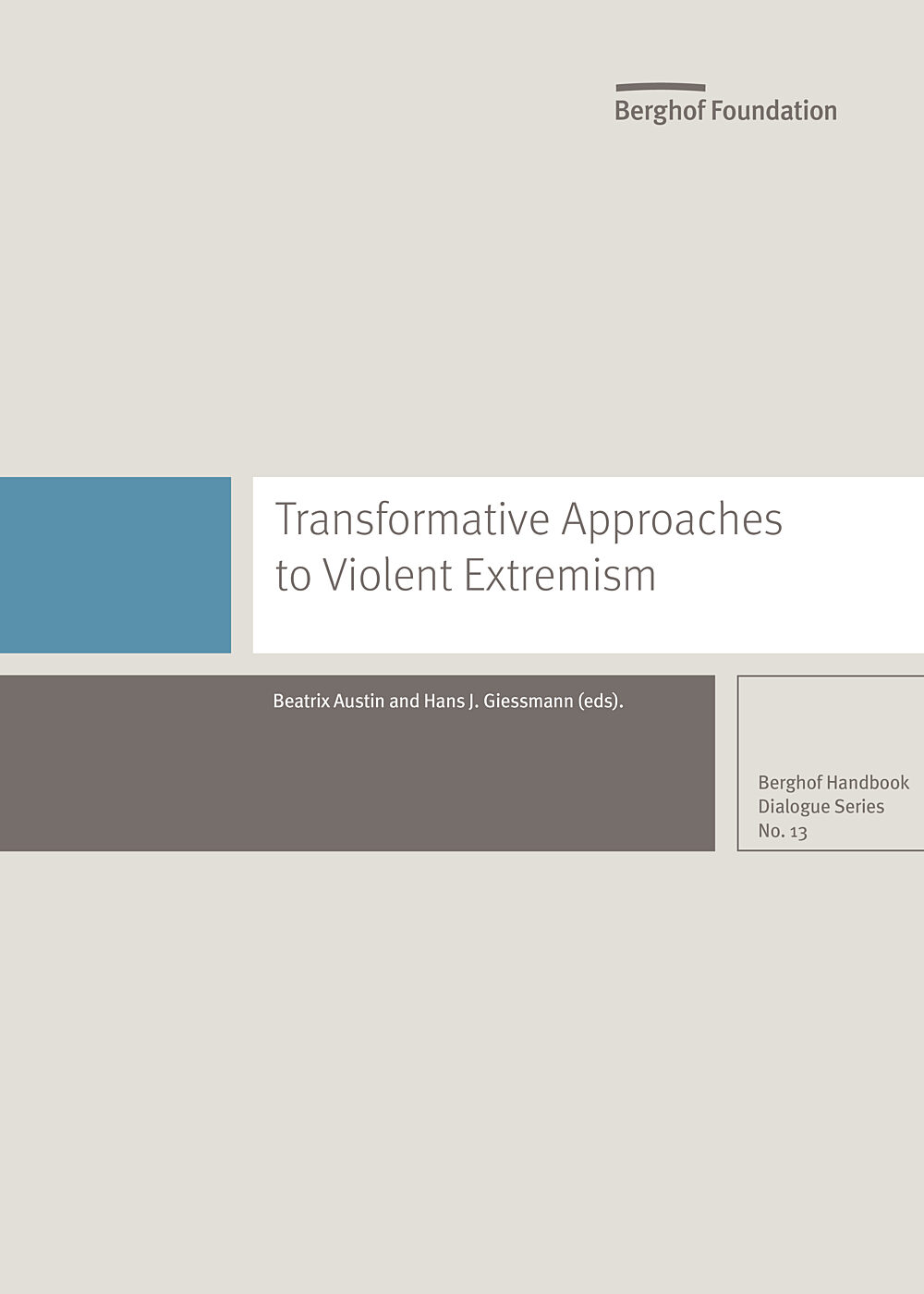
Transformative Approaches to Violent ExtremismHandbook Dialogue Series No. 13 - complete
Dealing with violent extremism (VE) has emerged as a central framework of analysis and policy-making in most Western and non-Western government agencies. It is also heavily shaping the programming of non-governmental agencies, not least due to the availability of related funding lines.
While there is an undeniable need to address violent extremism, this latest Berghof Handbook Dialogue takes as one premise that more often than not, analysis and programming to date often fall short in understanding and tackling the root causes of the phenomenon. Our lead article proposes: "Ultimately, addressing VE is fundamentally about conflict transformation, yet CVE/PVE interventions are rarely designed to be transformative."
- Year2018
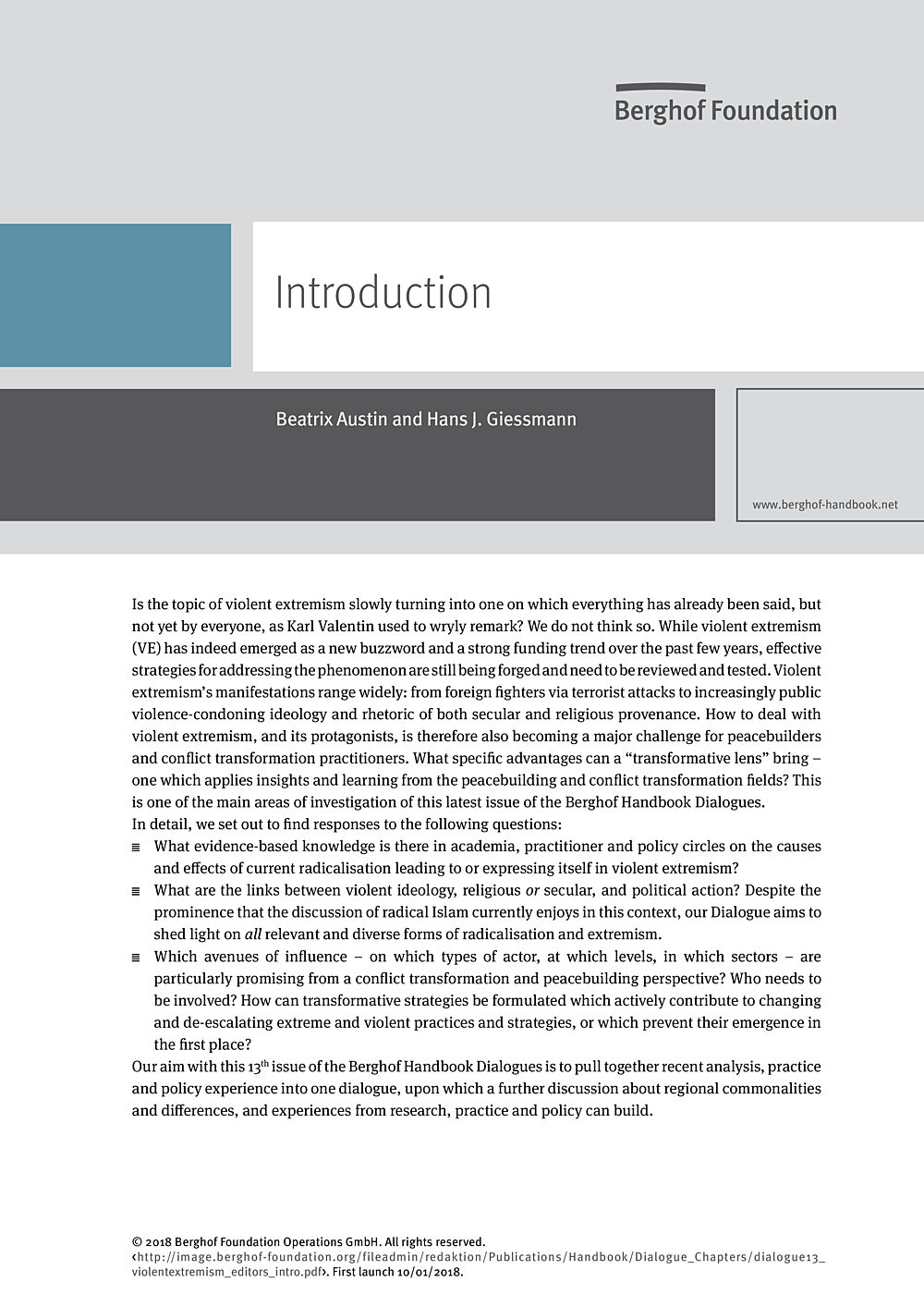
Berghof Handbook Dialogue Series No. 13 - IntroductionHandbook Dialogue Series No. 13
Berghof Handbook Dialogue No. 13 looks more deeply at what it takes to formulate transformative approaches to violent extremism. The lead article by Mohammed Abu-Nimer puts a call for interreligious peacebuilding centre-stage, which takes seriously and truly integrates the perspective of actors otherwise often defined as part of the problem. Respondents from a variety of backgrounds will, over the months to come, discuss these propositions. They will shed light on systemic contexts, the role of identity and gender, practice-oriented work with youth and regional contexts such as the Western Balkans and the MENA region.
- Year2018
- Author(s)Beatrix Austin, Hans-Joachim Giessmann
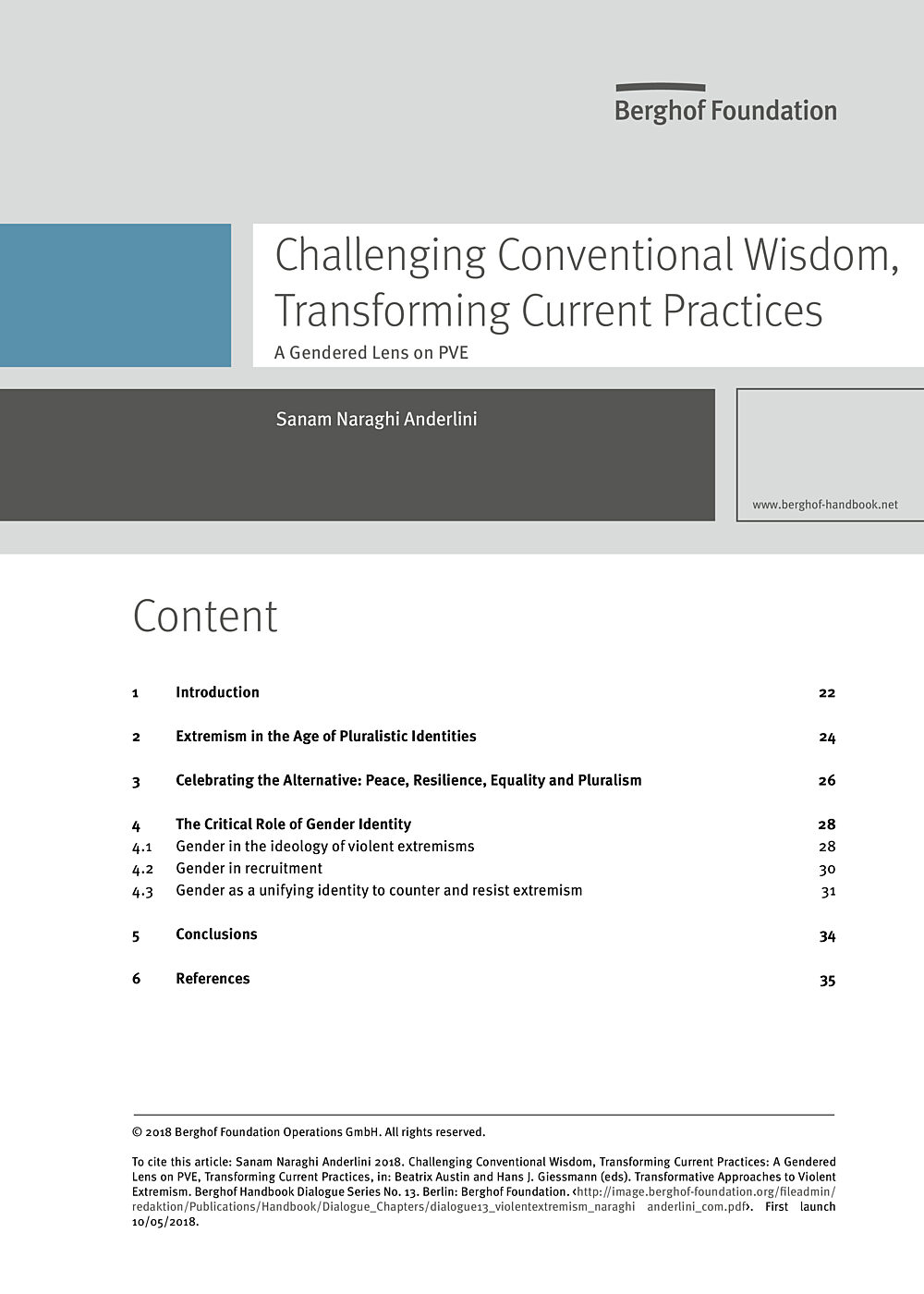
Challenging Conventional Wisdom, Transforming Current Practices: A Gendered Lens on PVEBerghof Handbook Dialogue Series No. 13 - comment
In responding to Abu-Nimer’s framing article, this paper offers points of agreement and difference in an effort to deepen our collective understanding of the phenomenon of violent extremism and the responses needed to enable effective transformation. It does so first by offering a conceptual shift to move beyond limitations of the current terminology and discourse. Second, it provides an overview of the relevance of identity to VE with particular attention to the centrality of gender to the ideology, recruitment and action of violent extremists, as well as the importance of women in particular in countering, preventing and providing clear alternatives to such groups. In doing so, it challenges Abu-Nimer’s assertion that the inclusion of women is often externally driven and that they are thus being instrumentalised.
- Year2018
- Author(s)Sanam Naraghi-Anderlini
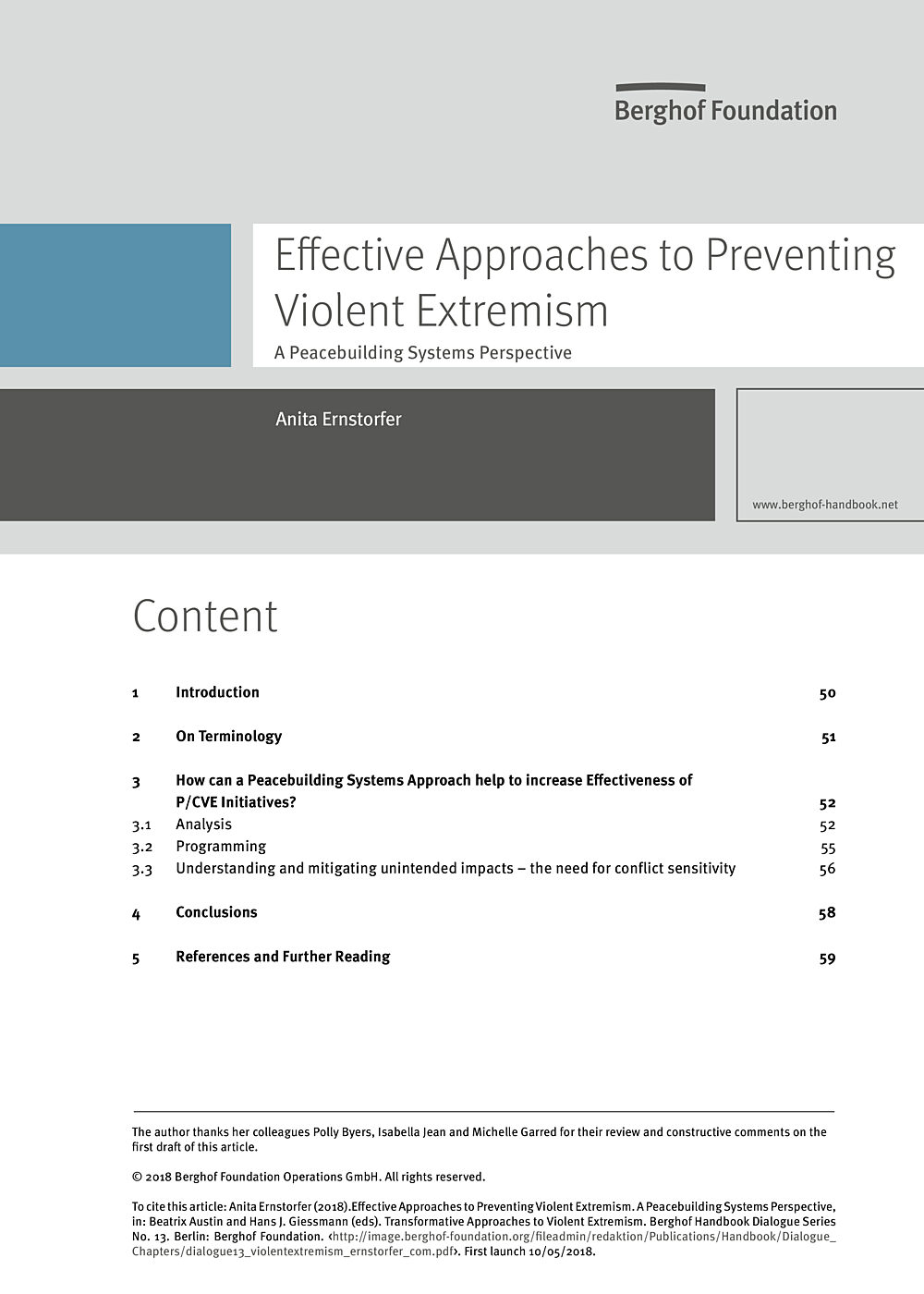
Effective Approaches to Preventing Violent Extremism: A Peacebuilding Systems PerspectiveBerghof Handbook Dialogue Series No. 13 - comment
This response to Mohammed Abu-Nimer’s 'Alternative Approaches to Transforming Violent Extremism. The Case of Islamic Peace and Interreligious Peacebuilding' is focused on the question of what makes prevention of violent extremism approaches effective. It will explore in more detail some of the points raised in the lead article related to an insufficient understanding of structural drivers of violent extremism (VE), the limited evidence base and research in relation to the ‘prevention’ or ‘countering’ of violent extremism (P/CVE), unrealistic donor expectations, and weak and externally imposed programme designs. It specifically responds to the encouragement of Abu-Nimer’s request to “delve deeper” into analysing structures of violence, not only the symptoms (Abu-Nimer 2018, 17).
This article will explore how to maximise the potential for positive peace impacts of different approaches to preventing violent extremism by applying principles from the peacebuilding field and a systems perspective.
- Year2018
- Author(s)Anita Ernstorfer
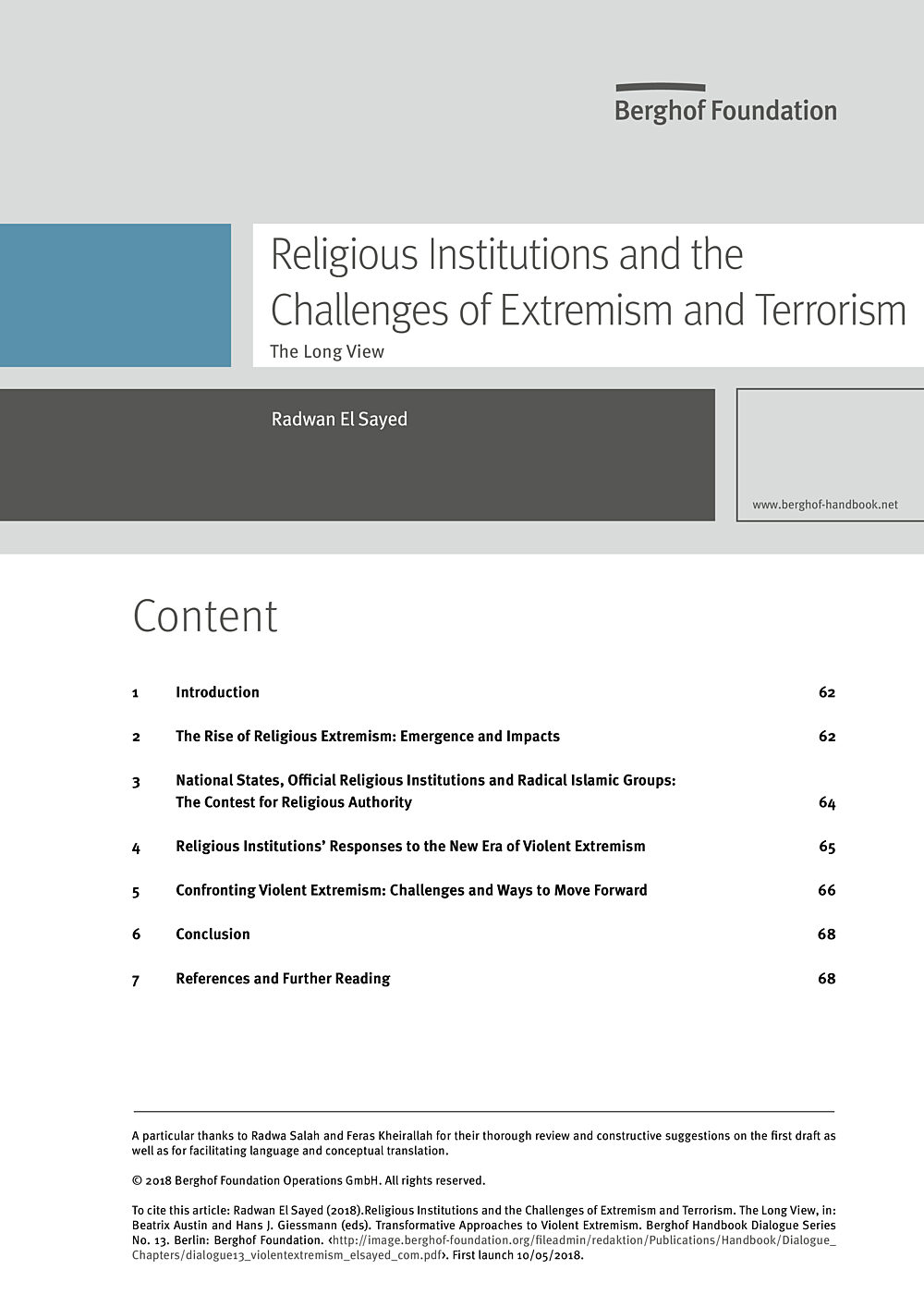
Religious Institutions and the Challenges of Extremism and Terrorism: A Long ViewBerghof Handbook Dialogue Series No. 13 - comment
This article will trace how religious institutions have dealt with the phenomena of radicalisation and violent extremism since the early 1970s and the role these institutions have recently played in C/PVE programmes. My essay intersects with the discussion in the lead article on the lack of clear long-term strategies and tool kits that assist religious institutions to participate effectively in C/PVE programmes without threatening their credibility with their constituencies. (1) This includes the necessity of empowering the religious institutions to develop tools and frameworks that use the language of faith and reflect their spiritual and religious traditions. (2) Based on the impact of a certain securitisation of C/PVE approaches in the region on the religious institutions and their constituencies, I am convinced that it is important for religious institutions to rebuild the trust with their constituencies based on the principle of inclusivity and enhanced outreach efforts.
- Year2018
- Author(s)Radwan Al-Sayed
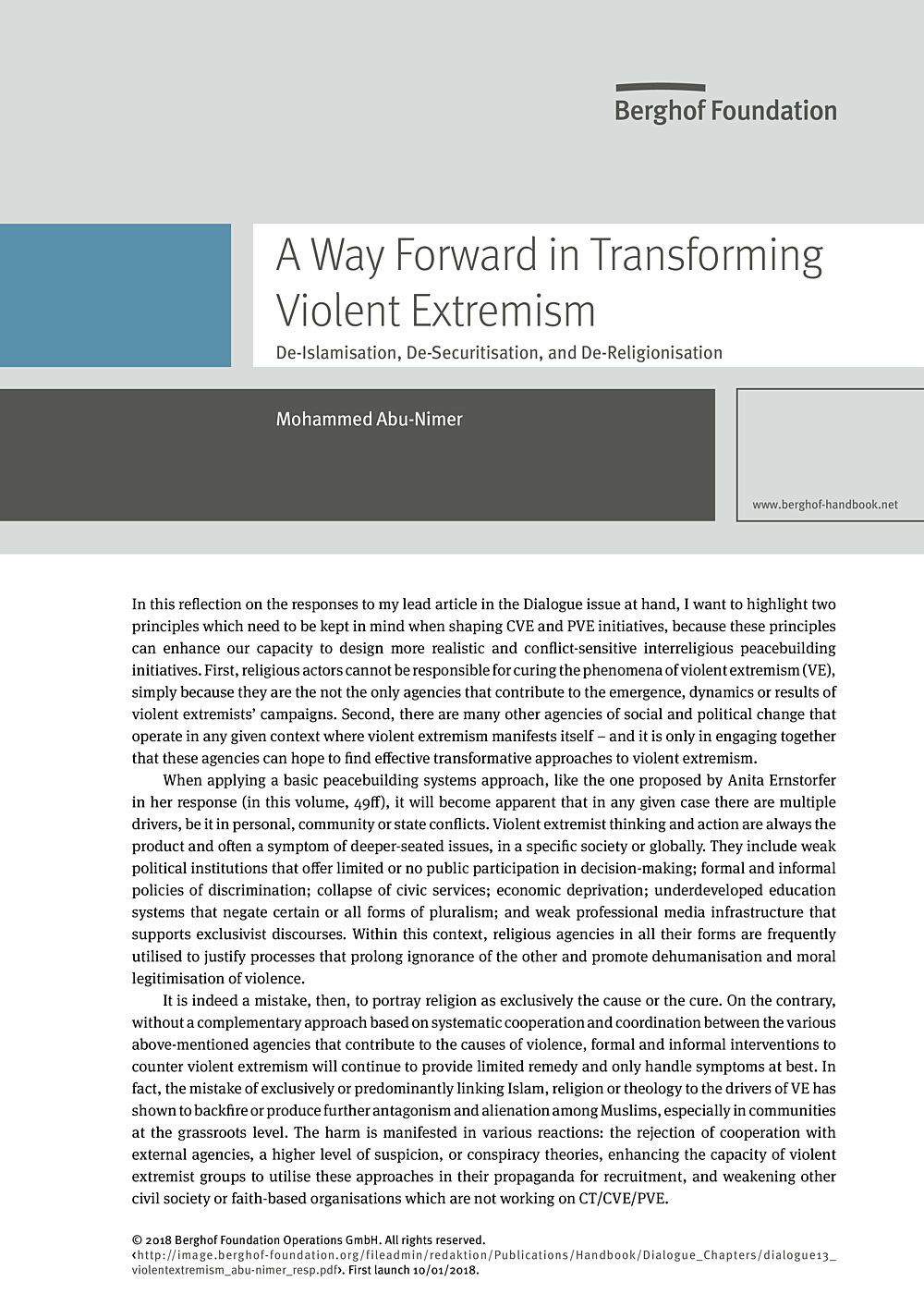
A Way Forward in Transforming Violent Extremism: De-Islamisation, De-Securitisation, and De-ReligionisationHandbook Dialogue Series No. 13 - final reflection
In this reflection on the responses to my lead article in the Dialogue issue at hand, I want to highlight two principles which need to be kept in mind when shaping CVE and PVE initiatives, because these principles can enhance our capacity to design more realistic and conflict-sensitive interreligious peacebuilding initiatives. First, religious actors cannot be responsible for curing the phenomena of violent extremism (VE), simply because they are the not the only agencies that contribute to the emergence, dynamics or results of violent extremists’ campaigns. Second, there are many other agencies of social and political change that operate in any given context where violent extremism manifests itself – and it is only in engaging together that these agencies can hope to find effective transformative approaches to violent extremism.
- Year2018
- Author(s)Mohammed Abu-Nimer
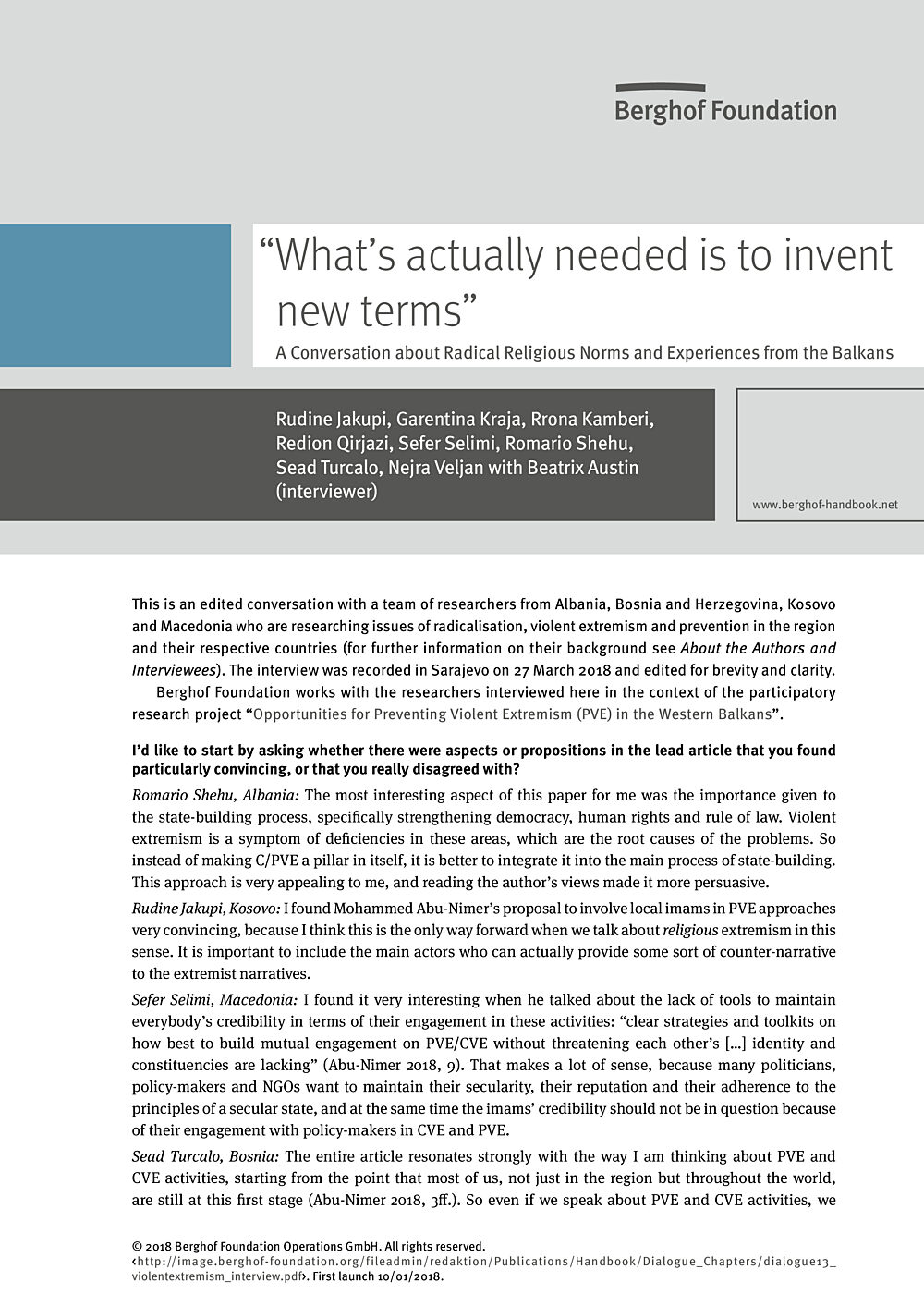
'What is actually needed is to invent new terms': An interview on Radical Religious Norms and Experiences from the BalkansBerghof Handbook Dialogue Series No. 13 - comment
This interview with Rudine Jakupi, Garentina Kraja, Rrona Kamberi, Redion Qirjazi, Sefer Selimi, Romario Shehu, Sead Turcalo and Nejra Veljan is an edited conversation with a team of researchers from Albania, Bosnia and Herzegovina, Kosovo and Macedonia who are researching issues of radicalisation, violent extremism and prevention in the region and their respective countries. The interview was recorded in Sarajevo on 27 March 2018 and edited for brevity and clarity. Berghof Foundation works with the researchers interviewed here in the context of the participatory research project "Opportunities for Preventing Violent Extremism (PVE) in the Western Balkans".
- Year2018
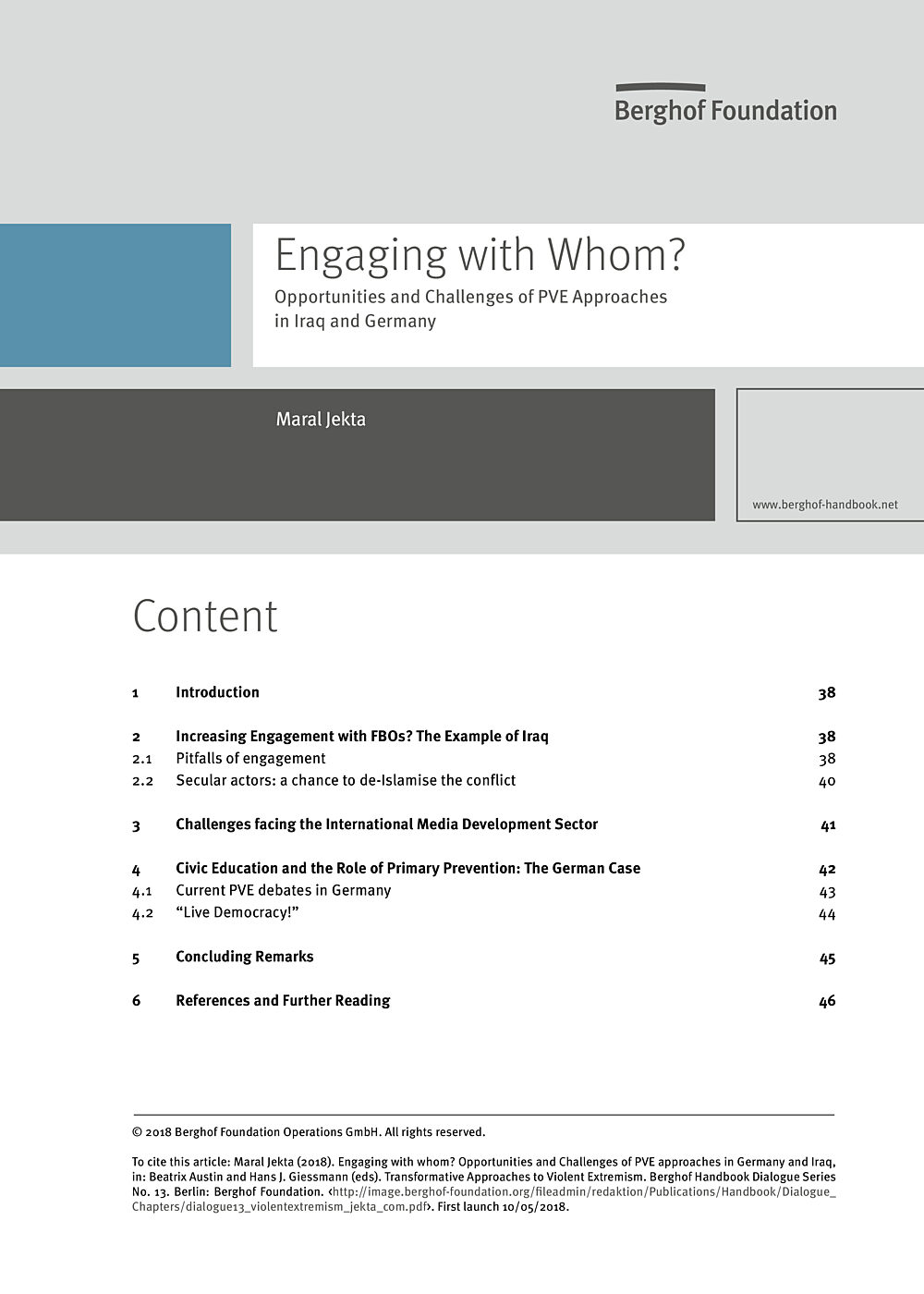
Engaging with whom? Opportunities and Challenges of PVE approaches in Germany and IraqBerghof Handbook Dialogue No. 13 - comment
This comment on the lead article to our Handbook Dialogue on Transformative Approaches to Violent Extremism discusses Abu-Nimer’s suggestion to engage more seriously with religious agencies and actors, using Iraq as an example.
It examines how religion and its identity components are being integrated in project structures of international NGOs (INGOs) in Iraq and the limitations of this approach. It also presents the negative impact of CVE/PVE approaches on practitioners in the field of international media development. Finally, the article discusses the German Government’s ‘Live Democracy!’ to support the call for a holistic ‘idealism’ approach in PVE.
- Year2018
- Author(s)Maral Jekta
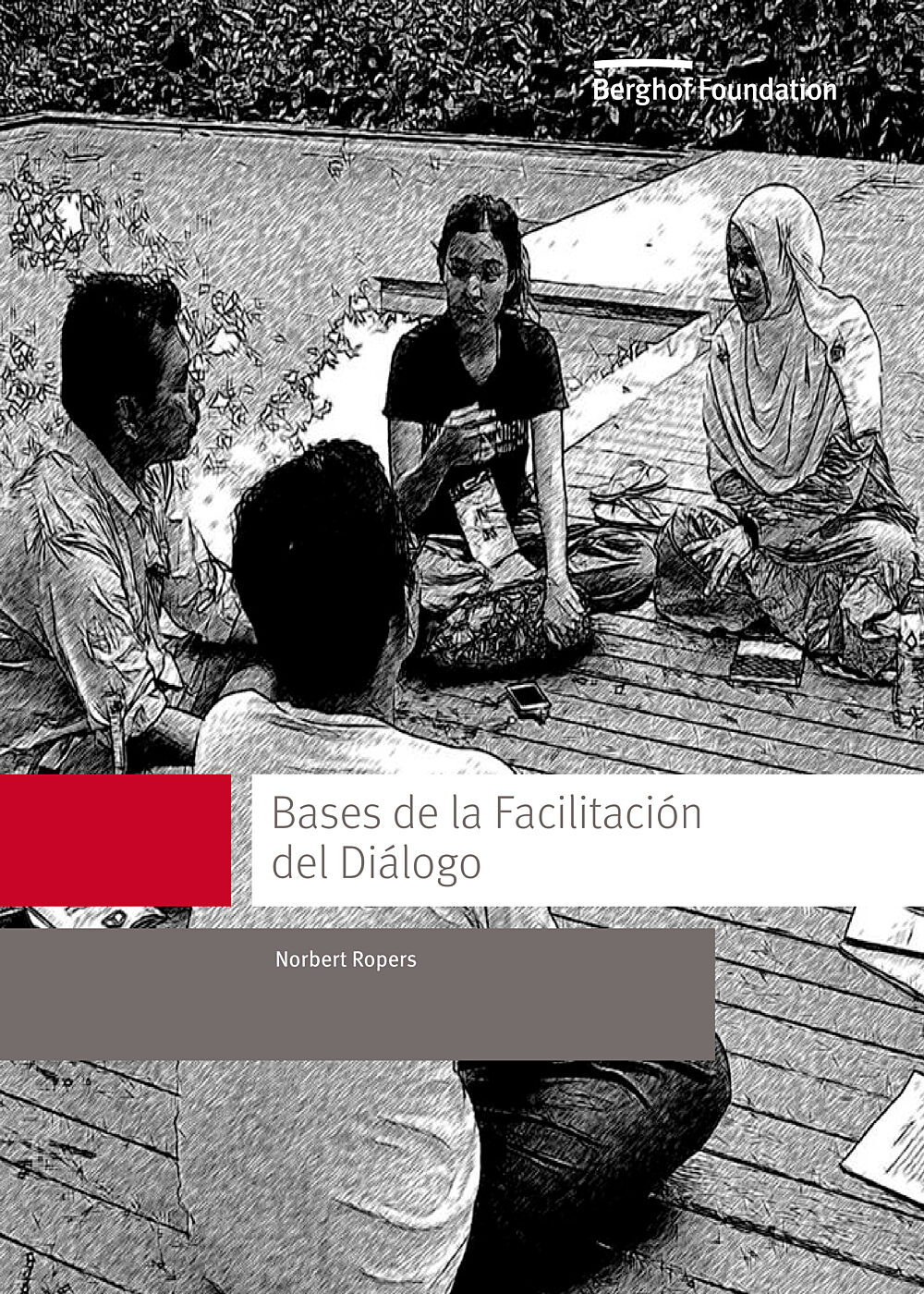
Bases de la Facilitación del Diálogo
Diálogo – el intercambio significativo y significante de percepciones y opiniones – es uno de los métodos más frecuentes a los que las personas recurren cuando se trata de cuestiones conflictivas. Enfoques como mediación y negociación, a menudo utilizados para resolver diferencias a nivel político y social, incorporan elementos de diálogo, más si se está tratando con un diálogo de alto nivel, como el que se sostuvo en el Yemen o en Sudán en los últimos años por medio de reuniones regionales o encuentros comunales. En estos escenarios de conflicto es crucial que se proceda convocando y celebrando reuniones de diálogo cuidadosamente – especialmente en aquellos con el potencial de tornarse violentos. A pesar de un sinnúmero de manuales y reflexiones sobre el buen diálogo, la pregunta de cómo prepararse y establecer un diálogo exitoso sigue siendo apremiante e intrigante para los y las practicantes y académicos/as por igual.
- Year2018
- Author(s)Norbert Ropers
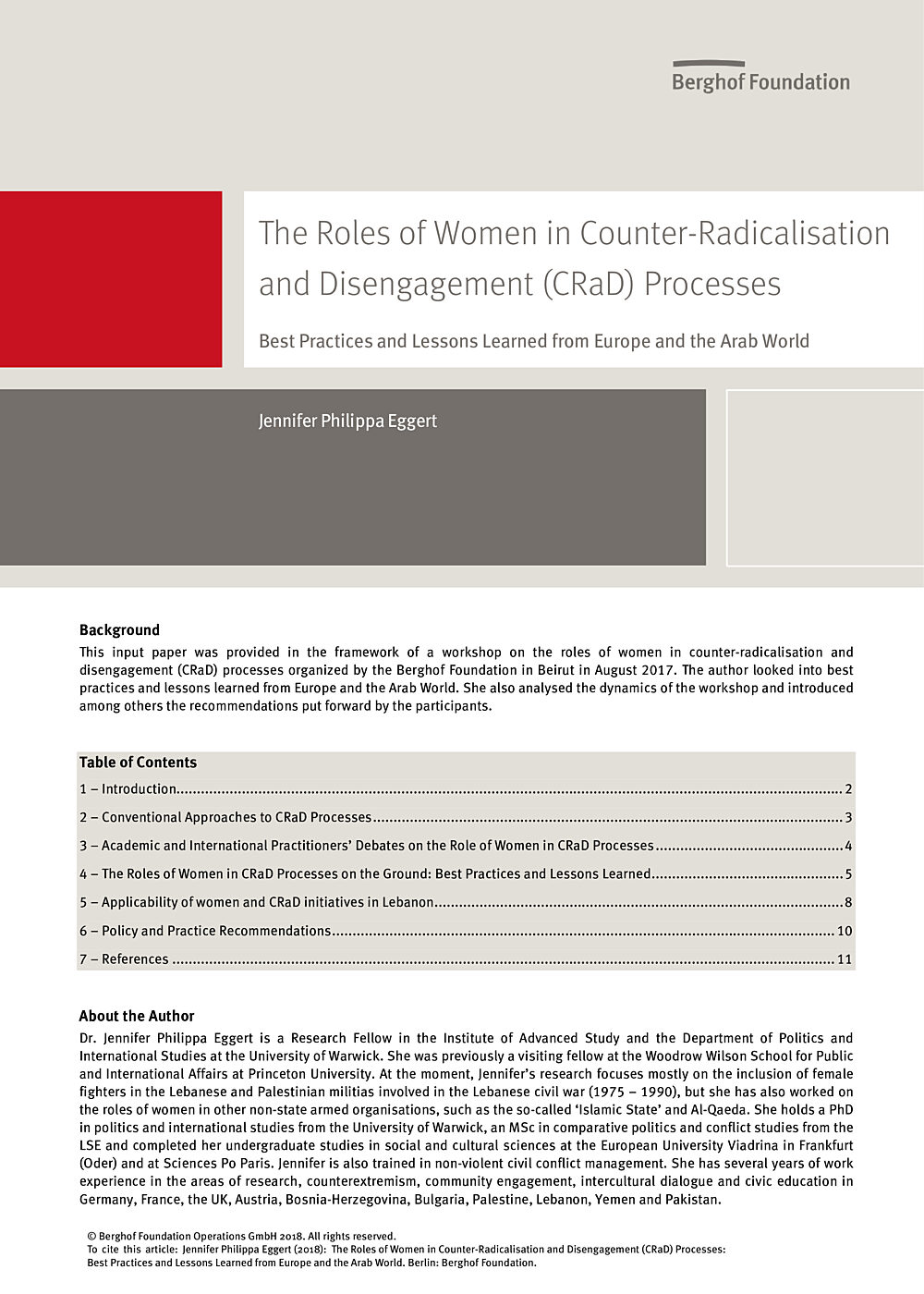
The Roles of Women in Counter-Radicalisation and Disengagement (CRaD) ProcessesBest Practices and Lessons Learned from Europe and the Arab World
This input paper was provided in the framework of a workshop on the roles of women in counter-radicalisation and disengagement (CRaD) processes organized by the Berghof Foundation in Beirut in August 2017. The author looked into best practices and lessons learned from Europe and the Arab World. She also analysed the dynamics of the workshop and introduced among others the recommendations put forward by the participants.
- Year2018
- Author(s)Jennifer Philippa Eggert